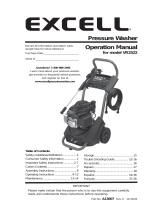
4- ENG
DANGER: RISK TO BREATHING (ASPHYXIATION)
WHAT CAN HAPPEN HOW TO PREVENT IT
• Breathing exhaust fumes will cause
serious injury or death! Engine
exhaust contains carbon monoxide,
anodorlessanddeadlygas.
• Operate pressure washer in a well-
ventilated area. Avoid enclosed areas
suchasgarages,basements,etc.
• Never operate unit in or neara location
occupiedbyhumansoranimals.
• Some cleaning fluids contain
substanceswhichcouldcauseinjury
toskin,eyesorlungs.
• Use only cleaning fluids specifically rec-
ommended for high-pressure washers.
Follow manufacturersrecommendations.
Donotusechlorinebleachoranyother
corrosivecompound.
DANGER: RISK OF FLUID INJECTION AND LACERATION
WHAT CAN HAPPEN HOW TO PREVENT IT
• Yourpressurewasheroperatesatfluid
pressuresandvelocitieshighenough
topenetratehumanandanimalflesh,
which could result in amputation or
other serious injury. Leaks caused
byloosefittingsorwornordamaged
hoses can result in injection injuries.
DO NOT TREAT FLUID INJECTION
AS ASIMPLECUT!Seeaphysician
immediately!
• Inspect the high-pressurehose regularly.
Replace the hose immediately if it is
damaged, worn, has melted from
contactingtheengine,orshowsanysigns
of cracks, bubbles, pinholes, or other
leakage. Never grasp a high-pressure
hosethatisleakingordamaged.
• Nevertouch,grasporattempttocovera
pinholeorsimilarwaterleakonthehigh-
pressure hose. The stream of water IS
underhighpressureandWILLpenetrate
skin.
• Neverplacehandsinfrontofnozzle.
• Directsprayawayfromselfandothers.
• Makesurehoseandfittingsaretightened
and in good condition. Never hold onto
thehoseorfittingsduringoperation.
• Donotallowhosetocontactmuffler.
• Never attach or remove wand or hose
fittingswhilesystemispressurized.
• Whenusingreplacementlancesorguns
with thispressure washer, DONOT use
a lance and/or lance/gun combination
that is shorter in length than what was
provided with this pressure washer as
measured from the nozzle end of the
lancetotheguntrigger.
• Injuries canresult ifsystempressure
is not reduced before attempting
maintenanceordisassembly.
• To relieve system pressure, shut off
engine,turnoffwatersupplyandpullgun
triggeruntilwaterstopsflowing.
• Use only accessories rated equal to or
higher than the rating of the pressure
washer.




















